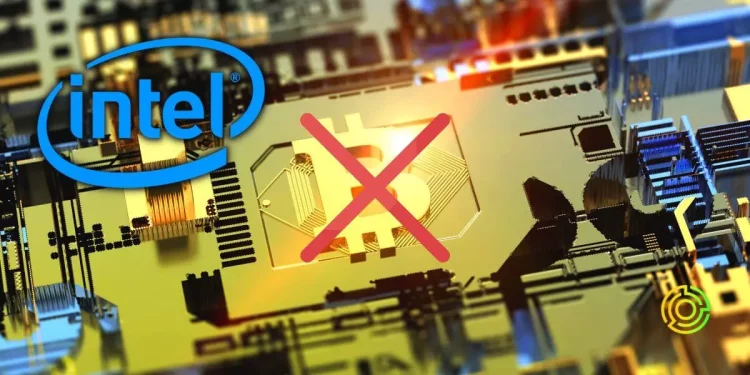The popularity of cryptocurrency mining has impacted numerous chip manufacturers, including Intel, which has announced the halt of production of its Blockscale 1000 Series ASIC Bitcoin mining chips after just a year since its introduction. The decision is largely attributed to the decline of the cryptocurrency market.
What led to Intel halting the production of Bitcoin mining chips?
The decline of the cryptocurrency market has been the primary reason for Intel’s decision to halt the production of Bitcoin mining chips. The company expects to stop accepting orders for the Blockscale chip series by October 20 of this year and complete shipping by April 20 of next year.
Intel aims to focus on IDM 2.0, its strategy to outsource chip manufacturing to external clients while continuing to expand the production of smaller, faster chips.
The impact of Intel’s decision on the Bitcoin mining industry
Intel’s decision to halt production of its Bitcoin mining chips is not expected to have a significant impact on the industry. However, it demonstrates how volatility in the cryptocurrency market can affect chip manufacturers that depend on miners’ demand.
Intel’s decision to focus on IDM 2.0 suggests that the company is looking to diversify and not depend too much on cryptocurrency mining.
Argo Blockchain, Block, Hive Blockchain Technologies, and GRIID Infrastructure were among the early clients of Intel’s Blockscale 1000 Series ASIC Bitcoin mining chips. The cessation of production will not affect existing customers, as Intel will continue to provide support.
Although Intel has halted production of its Bitcoin mining chips, the company will continue to monitor opportunities in the cryptocurrency space. This suggests that Intel is not completely withdrawing from the cryptocurrency industry but is looking to expand and diversify its business.
With IDM 2.0, Intel aims to outsource its chip manufacturing to external clients, allowing it to focus on the production of smaller, faster chips.
Although this may seem like a sign that the cryptocurrency mining industry is declining, it is important to remember that volatility in the cryptocurrency market is a constant reality. It is likely that chip manufacturers will continue to adapt to the changing demands of the market and seek opportunities in areas beyond mining.
FAQs
Why did Intel stop the production of its Bitcoin mining chips?
Intel halted the production of its Bitcoin mining chips primarily due to the decline of the cryptocurrency market.
What is IDM 2.0?
IDM 2.0 is Intel’s strategy to outsource chip manufacturing to external clients while continuing to expand the production of smaller, faster chips.
Will the cessation of production affect existing customers of Intel’s Blockscale 1000 Series ASIC Bitcoin mining chips?
No, the cessation of production will not affect existing customers as Intel will continue to provide support.
Conclusion
The decision by Intel to halt the production of its Bitcoin mining chips is a clear indication of the impact that the volatility of the cryptocurrency market can have on-chip manufacturers.
It also highlights the need for these manufacturers to diversify their businesses and seek out other opportunities beyond cryptocurrency mining.
The IDM 2.0 strategy by Intel shows that the company is not completely pulling out of the cryptocurrency industry but rather looking to expand its focus and diversify its offerings.
This move also shows that Intel is still monitoring the opportunities in the cryptocurrency space and is likely to adapt to the changing market demands.
Overall, while the impact of Intel’s decision may be minimal, it serves as a reminder of the ever-changing nature of the cryptocurrency market and the need for companies to remain flexible and adaptable in the face of such volatility.
Follow us on our social networks and keep up with everything that happens in the Metaverse!
Twitter Linkedin Facebook Telegram Instagram Google News











































